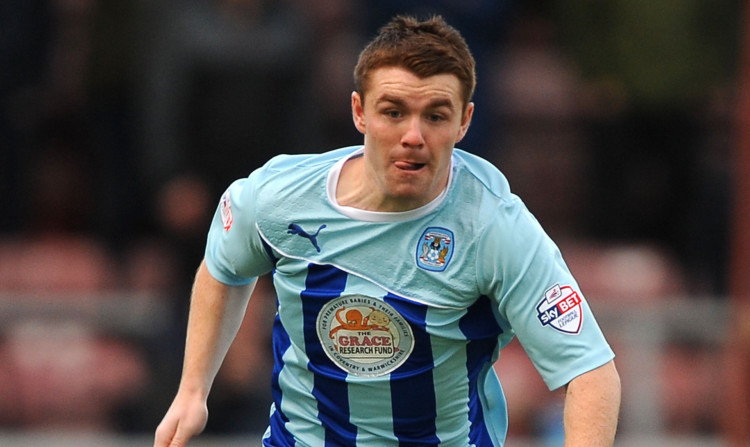
John Fleck knows what he is talking about when he warns against burdening kids with heavy expectation.
The former Rangers prodigy was just a few months past his 17th birthday when he was labelled Scotland’s Wayne Rooney. To be fair, it had been coming.
He was only 15 years old when the Light Blues used him in a pre-season tour of Germany.
At 16 he became the youngest-ever player to appear in a Cup Final in Britain, coming off the substitutes’ bench to face Queen of the South in the Scottish showpiece at Hampden.
Yet while his precocious rise earned him comparisons with England’s attacking talisman, it added to his frustration when his progress stalled.
And as he watches Ryan Gauld garner ever more attention, Fleck fears the Dundee United teen will do well not to get distracted.
“I think he has got it even worse than I did,” says Fleck, now plying his trade in England’s League One with Coventry City.
“Get compared to Wayne Rooney and you are going to have a lot to live up to,” he reflects.
“He is a great footballer who has gone on to be England’s main striker. But when your team-mates are calling you “Mini Messi” at 17, there is not really any place left to go!
“Messi is 26, with years ahead of him, but already there are plenty of people who would tell you he is the greatest footballer of all time.”
The challenge for Gauld right now is not becoming the best of the best, but establishing himself as a first-team regular at Tannadice.
“When you are a young boy, it is all about playing first-team football,” Fleck continues.
“You have ability, or you would not be there in the first place.
“What you don’t have, and what you can’t have when you are starting out, is experience.
“That is all-important because it allows you to deal with all the situations the game throws at you.
“I’m talking about things people would take for granted as part of the game injuries, competition and loss of form.
“Everyone can have a bad game now and again. Everyone can come up against an opponent they find tough to play against for whatever reason.
“If you have been in that position before and come back from it in a positive fashion, you’re less likely to worry.
“I think, even now, there is no doubt that Ryan Gauld is a very good player.
“From what I’ve seen of him, he has very quick feet and excellent vision. It is a good combination because it means he can not only see passes, but has the ability to execute them.
“For a player his age to get four assists in a match, like he did against Partick Thistle recently, is exceptional and those were all the goals United got that game. We are not talking about four assists in a 9-0 rout.
“However, as any manager will tell you, what clubs are after are guys that can perform to a high level week in, week out.
“Now I’m sure Ryan can get there, but people should definitely be wary of expecting too much from him too soon.
“If that happens, it could actually hinder his progress, which would be bad news for United and, ultimately, bad news for Scotland.
“We all hope he will fulfil the potential he is showing. But people have to recognise players develop at different rates and to different levels.”
Fleck’s own experience backs his argument Having burst onto the Scottish scene, he struggled to hold down a place in a Rangers side under pressure to win every week.
Brief run-outs off the subs bench gave him little chance to get a rhythm going and in January, 2012, he went to Blackpool on loan.
Five months later he became one of the players to reject his Rangers contract being transferred to the new company set up by Charles Green.
He switched to Coventry City, but held out for a deal that will give the Ibrox club a sizeable fee if he is sold on.
“It has worked out well for me,” insists the 22-year-old Scot. “I was never one for reading about myself or listening out for my name on the radio or television.
“You do, however, have ambitions that you want to achieve in the game, and it was great to get a chance so early in my career.
“But once you have played for Rangers, it becomes really frustrating to have to watch from the sidelines.
“I appreciated that wasn’t easy because of the demands that have always been on the club, and will always be there in the future.
“The sensible option, then, was to go somewhere I would be able to get first-team football and develop my career from there.
“That doesn’t seem an issue for Gauld, but if he keeps developing the way he has been, then the time is likely to come when he is going to have a decision to make.
“And choosing the right place to play your football is a huge decision to make, regardless of the level you are operating at.
“Sometimes you have to go down to go up. I’m maybe in League One just now but I am happy and enjoying my football.”
Fleck now hopes the same will hold true for Chris Maguire, once of Aberdeen and Scotland’s Under-21 side.
The 24-year-old joined Coventry on loan from Sheffield Wednesday at the beginning of the month, and scored two goals on his debut in the away win over MK Dons.
“Chris couldn’t really have done much better,” says Fleck. “We won’t talk him up too much, though, because we don’t want him getting big headed!”

Enjoy the convenience of having The Sunday Post delivered as a digital ePaper straight to your smartphone, tablet or computer.
Subscribe for only £5.49 a month and enjoy all the benefits of the printed paper as a digital replica.
Subscribe